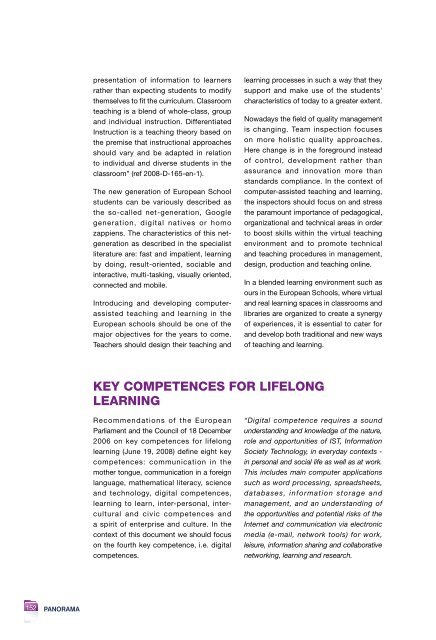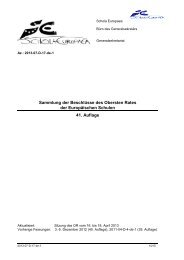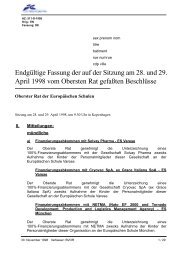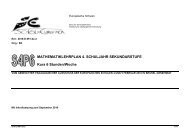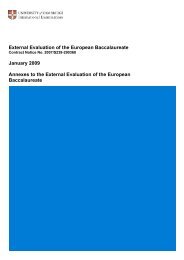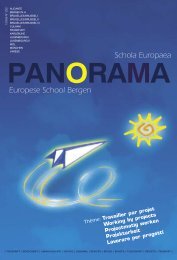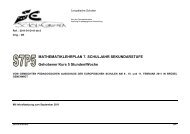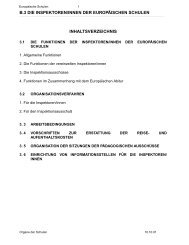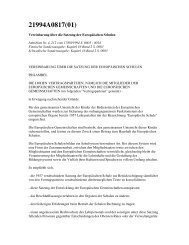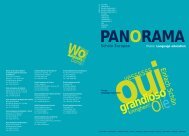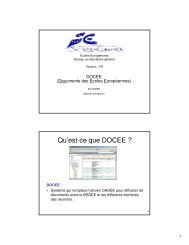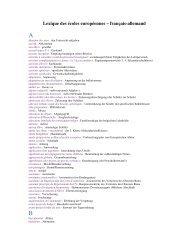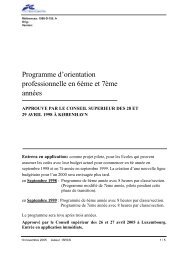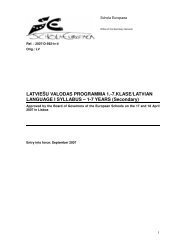Schola Europaea European School Brussels II
Schola Europaea European School Brussels II
Schola Europaea European School Brussels II
You also want an ePaper? Increase the reach of your titles
YUMPU automatically turns print PDFs into web optimized ePapers that Google loves.
152<br />
PANORAMA<br />
presentation of information to learners<br />
rather than expecting students to modify<br />
themselves to fit the curriculum. Classroom<br />
teaching is a blend of whole-class, group<br />
and individual instruction. Differentiated<br />
Instruction is a teaching theory based on<br />
the premise that instructional approaches<br />
should vary and be adapted in relation<br />
to individual and diverse students in the<br />
classroom” (ref 2008-D-165-en-1).<br />
The new generation of <strong>European</strong> <strong>School</strong><br />
students can be variously described as<br />
the so-called net-generation, Google<br />
generation, digital natives or homo<br />
zappiens. The characteristics of this netgeneration<br />
as described in the specialist<br />
literature are: fast and impatient, learning<br />
by doing, result-oriented, sociable and<br />
interactive, multi-tasking, visually oriented,<br />
connected and mobile.<br />
Introducing and developing computerassisted<br />
teaching and learning in the<br />
<strong>European</strong> schools should be one of the<br />
major objectives for the years to come.<br />
Teachers should design their teaching and<br />
Recommendations of the <strong>European</strong><br />
Parliament and the Council of 18 December<br />
2006 on key competences for lifelong<br />
learning (June 19, 2008) define eight key<br />
competences: communication in the<br />
mother tongue, communication in a foreign<br />
language, mathematical literacy, science<br />
and technology, digital competences,<br />
learning to learn, inter-personal, intercultural<br />
and civic competences and<br />
a spirit of enterprise and culture. In the<br />
context of this document we should focus<br />
on the fourth key competence, i.e. digital<br />
competences.<br />
learning processes in such a way that they<br />
support and make use of the students'<br />
characteristics of today to a greater extent.<br />
Nowadays the field of quality management<br />
is changing. Team inspection focuses<br />
on more holistic quality approaches.<br />
Here change is in the foreground instead<br />
of control, development rather than<br />
assurance and innovation more than<br />
standards compliance. In the context of<br />
computer-assisted teaching and learning,<br />
the inspectors should focus on and stress<br />
the paramount importance of pedagogical,<br />
organizational and technical areas in order<br />
to boost skills within the virtual teaching<br />
environment and to promote technical<br />
and teaching procedures in management,<br />
design, production and teaching online.<br />
In a blended learning environment such as<br />
ours in the <strong>European</strong> <strong>School</strong>s, where virtual<br />
and real learning spaces in classrooms and<br />
libraries are organized to create a synergy<br />
of experiences, it is essential to cater for<br />
and develop both traditional and new ways<br />
of teaching and learning.<br />
KEY COMPETENCES FOR LIFELONG<br />
LEARNING<br />
“Digital competence requires a sound<br />
understanding and knowledge of the nature,<br />
role and opportunities of IST, Information<br />
Society Technology, in everyday contexts -<br />
in personal and social life as well as at work.<br />
This includes main computer applications<br />
such as word processing, spreadsheets,<br />
databases, information storage and<br />
management, and an understanding of<br />
the opportunities and potential risks of the<br />
Internet and communication via electronic<br />
media (e-mail, network tools) for work,<br />
leisure, information sharing and collaborative<br />
networking, learning and research.


